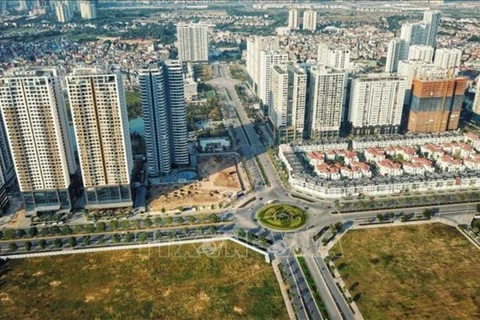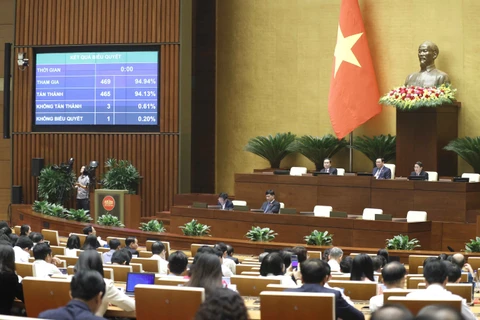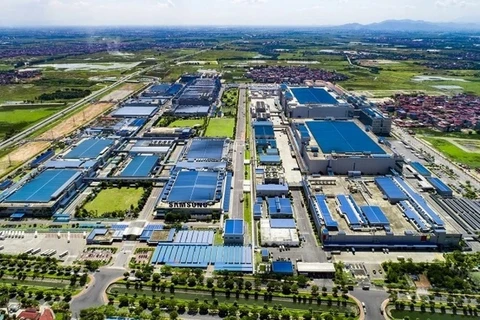 At the Vietnam Real Estate Summit 2023 held by Batdongsan.com.vn in HCM City last week. (Photo courtesy of the organiser)
At the Vietnam Real Estate Summit 2023 held by Batdongsan.com.vn in HCM City last week. (Photo courtesy of the organiser) Speaking at the Vietnam Real Estate Summit 2023 held by Batdongsan.com.vn in Ho Chi Minh City last week, Nguyen Quac Anh, deputy general director of the property listing platform, said the Vietnamese real estate market in 2023 has been experiencing positive changes and mirroring a previous cycle.
Specifically, real estate inventory increased strongly while prices slumped in the 2008-2012 period, until a reversal signal appeared 2013 when credit was loosened, and a 30 trillion VND credit support package and the Amended Land Law were passed to support the real estate market.
Currently, in terms of interest rates, the State Bank of Vietnam has adjusted the ceiling deposit interest rates three times and lowered the policy interest rates four times this year. Many commercial banks have reduced deposit interest rates by 3-5% compared to the beginning of the year.
Credit growth of the entire banking sector reached 8.21% as of November 22, lower that the credit growth target of 14-15% for this year.
In addition, the Law on Real Estate Business and the Law on Housing were passed last month, and will take effect from the beginning of 2025, while the Government's policies to support the sector will boost the market, he said.
He predicted that the real estate market will show signs of a turnaround from Q2 to Q4 next year, with liquidity coming from apartment products meeting real housing needs.
The market will enter a consolidation period from Q4 2024 to Q1 2025 under the condition that monetary tools and policies are promoted on a large scale, helping to overcome difficulties in terms of capital resources. In addition, the Law on Real Estate Business and Law on Housing, which will take effect from the beginning of 2025, will contribute to freeing up money sources and resolving regulatory issues to create motivation for the market to develop in a sustainable manner.
The market will then enter a period of prosperity from Q2 to Q4 of 2025, he said, adding that this period will record strong economic development. Investors’ financial capacity and the monetary environment will also improve, leading to a strong recovery in supply and liquidity in the market.
He also forecast that the market will enter a stable development period after the first quarter of 2026. At that time, the market will continue to enjoy good growth in terms of liquidity and prices, and many real estate products will appear, he added.
Worst of the downturn has passed
In his recent report, Michael Kokalari, chief economist at VinaCapital, said: “The downturn in Vietnam’s real estate market has bottomed out, partly because mortgage rates peaked and are now headed lower. While a full-scale revival in the market is not likely to take root until mid-2024, there are some signs that a rebound is already in the making, including significant increases in the prices of prime properties in downtown HCM City and Hanoi and a pickup in the volume of land lots changing hands.”
“The latter is a segment of the market which had been completely dead for months, and the recent activity is a good indication that long term investors (as well as speculators) have started paying attention to the real estate market again,” he said.
He also highlighted that the prices of new housing units offered for sale in HCM City and Hanoi are about flat year-on-year, but developers are reportedly offering mortgage assistance (e.g., extended grace periods) and other incentives to sell their units.
Furthermore, prices of apartments in the secondary market for which the seller does not have clear legal ownership status have seen a drop of circa 10%.
This is just one example of how legal and regulatory issues continue to be the main impediment to real estate development in Vietnam.
“While there has been some recent incremental progress towards resolving those issues, we do not expect meaningful progress until well into 2024; although we see green shoots in Vietnam’s real estate market, a full recovery is by no means underway yet,” he said.
At the beginning of November, senior government officials held high profile meetings with major Vietnamese developers to address issues that are impeding real estate development. Industry executives identified legal and regulatory issues as the source of most of the industry’s current difficulties, identifying inconsistencies in the current regulations and legal framework as particularly problematic.
Two weeks later, Prime Minister Pham Minh Chinh set up a special government task force to address those issues. By the end of November, new legislation was enacted to clarify certain specific issues such as the exact options developers have in order to fulfill their obligation to produce affordable/social housing, and how much of a deposit developers are allowed to collect from home buyers before a project’s construction commences.
“We also remain hopeful that the Government will take the necessary measures to alleviate the legal and regulatory bottlenecks that currently impede development activity in Vietnam. A recovery in the market would have broader implications for the overall economy, not just for real estate developers, and would go a long way toward boosting consumer confidence in Vietnam, which would in-turn also help support stock prices next year,” Kokalari added./.
VNA























